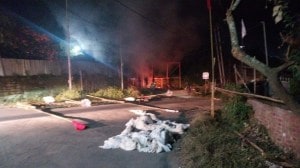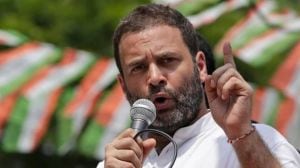Speaker in the cross-hairs in Haryana House, Dy CM Dushyant Chautala also takes aim
Amid signs of strained BJP-JJP ties, Deputy CM cites Bismarck quote to target the Chair for converting a short duration discussion into a calling attention debate for second day
 Haryana Deputy Chief Minister and JJP leader Dushyant Chautala. (Express photo)
Haryana Deputy Chief Minister and JJP leader Dushyant Chautala. (Express photo) The Haryana Assembly on Monday again saw fireworks between Deputy Chief Minister and JJP leader Dushyant Chautala and the Chair, which again converted a “short duration discussion” on an issue into a “calling attention” debate.
Last Friday, when the state Assembly’s monsoon session got underway, Dushyant, who also holds the disaster management portfolio, had strongly objected to the move of Deputy Speaker Ranbir Gangwa (who was then in the Chair) to turn a short duration discussion on the loss of life and property due to recent floods and water-logging in several parts of the state into a calling attention notice. The Chair had however prevailed with Dushyant being forced to reply to various issues raised by 23 MLAs on the matter.
On Monday, Speaker Gian Chand Gupta similarly converted a short duration discussion on millet-crop damages due to insect infestation in the state into a calling attention debate. The moment the Speaker allowed Congress MLA Rao Dan Singh to begin speaking on the calling attention notice, Dushyant again raised strong objection, saying that under the rules of the procedure of the House it was not permitted.
Dushyant pointed out that a similar conversion of a debate had happened in the House Friday and that following his objection Deputy Speaker Gangwa had assured him that “such a mistake shall not be repeated”.
The Deputy Speaker’s move had drawn sharp criticism from Dushyant, who had accused the former of “destroying” the “rules of procedure” of the Assembly by doing this conversion “without approval”. “Rules ki dhajjian udai jaa rahi hain, aisa nahi hona chahiye” (Rules are being destroyed. This should not be happening), he had then charged.
The JJP is the BJP’s junior partner in their coalition government led by Chief Minister Manohar Lal Khattar.
There have been signs of strains in the relations between the two allies over the last few months, with their leaders going after each other on various issues, especially over their plans for contesting the Lok Sabha as well as Assembly elections in 2024. It is another matter that both the parties have denied that there were any tension between them.
Earlier on Monday, when the Speaker turned the matter into a calling attention discussion, Dushyant had an exchange of words with him following which it was deferred. After the lunch break, when Gupta allowed the discussion on the calling attention notice, Dushyant made a sarcastic remark, saying “In that case regarding 2011 convention, can I say something on a lighter note? Yesterday, I read a quote from Germany’s first Chancellor Otto von Bismarck, Moorkh khud ki galti se seekhta hai, samajhdaar doosroon ki galtiyon se.” (Only a fool learns from his own mistakes. The wise man learns from the mistakes of others).
A visibly perturbed Speaker shot back, saying, “This is not a mistake. There is no mistake in this”.
Leader of Opposition (LoP) Bhupinder Singh Hooda too jumped into the row, asking Dushyant to specify whom he was calling a “fool” or a “wise man”. Dushyant claimed it was in 2011 when a short duration discussion was converted into a calling attention notice for the first time in the Haryana Assembly, adding that “That time, your party’s Kuldeep Sharma was in the Chair”.
The discussion eventually commenced on the calling attention notice.
Before that, Dushyant even went on to read out the specific powers that the Speaker holds as per the rules. “No appeal lies with the Speaker from the ruling given by the person presiding over the sitting of the House in the absence of the Speaker. Ruling given by the Chair settles the matter and cannot be reopened again.”
Gupta said he was not the one who was reopening the matter but Dushyant, to which the latter replied, “That is what I am pointing out that when the Chair had given a ruling (on Friday) that such an error shall not be committed again, why are we committing the same again today.”
Justifying his decision, Gupta said, “When our Deputy Speaker gave you that assurance, at that time all the calling attention notices were regarding the …damages floods caused across Haryana… Similarly, today’s calling attention notice is also regarding heavy loss of the millet crop due to insect infestation in the crop. All these notices are not different from each other. The issue is that millet crop has suffered damage, be it due to floods or insect infestation and be it the calling attention notice or short duration notice, all these pertain to the same cause.”
Dushyant countered Gupta by saying that “If we will give more powers to conventions over the rules of procedure, it would not be correct”.
“The House functions both on rules and conventions. Not only on rules and not only on conventions. We follow the conventions and it is not the first time that we are following such a convention. Rather these conventions are being followed since 2011,” the Speaker said in a bid to convince Dushyant, who had to finally reply to the points raised by the Opposition members on the discussion under the calling attention notice.
In short duration discussion, although any MLA can participate in it and speak on the subject, the debate concludes once the minister concerned gives his reply.
However, in the case of a calling attention debate, all those who have given the notice can speak and also ask supplementary questions of the minister after his reply. The minister concerned needs to be asked beforehand if a short duration discussion is being converted into a calling attention one so that he could prepare for the members’ supplementary questions.
Dushyant said that in the current case, “neither the members who gave the notice were asked by the Speaker, nor he, the Minister, was asked about it” before the conversion of the short duration discussion into a calling attention one, which is why, he charged, it was against the rules of the procedures of the House.
Photos




- 01
- 02
- 03
- 04
- 05



























